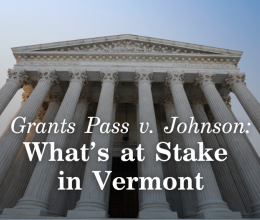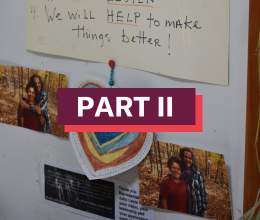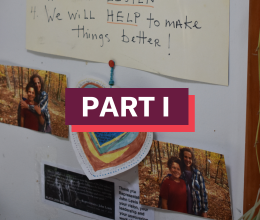
The Vermont Senate Judiciary Committee has now held two hearings on S.254, a bill that would end qualified immunity in Vermont. Qualified immunity is a court doctrine that prevents people who are victims of police misconduct from having their cases heard when their rights have been violated. Here’s a quick rundown of what the committee has heard so far:
We testified that Vermont should eliminate qualified immunity because it bars access to justice for victims of abuse, undermines the state’s police accountability efforts, and damages community trust. For all these reasons, it’s time to join other states that are moving to end this extreme and unjust legal doctrine.
Contact your legislator and urge them to end qualified immunity in Vermont.
Unfortunately, Vermont law enforcement has not seriously engaged with these concerns, relying instead on speculative and unsupported claims that without qualified immunity the sky will fall – claims that are directly contradicted by the experience in other states like Colorado that have already ended qualified immunity for police.
Here’s what some of the other committee witnesses have had to say:
- NAACP leaders Mia Schultz and Steffen Gillom both urged the committee to recognize the damage qualified immunity does to BIPOC communities in Vermont and to follow through on Vermont’s commitment to treating systemic racism as a public health emergency. Schultz called on Vermont to show the rest of country that we can act to remedy another form of systemic discrimination, one that does not reflect our values or our common humanity.
- Vermont attorney David Sleigh – who represents police officers as well as victims of police misconduct – testified that qualified immunity creates an “uneven playing field” for victims of police abuse, and described Vermont law enforcement opposition as “chicken littleism” that is unsupported by facts or evidence. Sleigh noted that another basic problem with qualified immunity is that it denies victims the right to gather evidence in discovery, evidence by which they can prove their rights were violated, which undermines the move towards greater transparency in law enforcement.
- SunCommon’s Duane Peterson, a former LAPD officer, testified that qualified immunity shields officers who by definition acted unreasonably, and that the right way for Vermont to recruit the next generation of law enforcement is not by clinging to an “inexcusable” legal doctrine. Peterson emphasized that victims of harm should be able to seek justice in a court of law, and qualified immunity violates that fundamental principle.
- The Cato Institute’s Jay Schweikert testified that qualified immunity harms good police officers and public confidence in policing, when officers who violate rights are not held accountable. Schweikert noted the elimination of qualified immunity can drive better incentives for better hiring, training and disciplinary policies, resulting in better policing.
-
Lieutenant Diane Goldstein of Law Enforcement Action Partnership (LEAP) emphasized that ending qualified immunity will not harm police but “will simply allow judges to hear the facts of the most egregious cases, which are currently causing the public perception that police are above the law.”
We are grateful to the Senate Judiciary committee for prioritizing this legislation, hopeful they will credit the compelling testimony they have heard – as well as the three in four Vermonters who support ending qualified immunity – and vote to advance this critical legislation to the full Senate.
Your support is making all the difference, and we hope you will continue to make your voice heard. Please contact your senators and representatives and ask them to support S.254.


